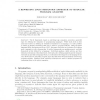Free Online Productivity Tools
i2Speak
i2Symbol
i2OCR
iTex2Img
iWeb2Print
iWeb2Shot
i2Type
iPdf2Split
iPdf2Merge
i2Bopomofo
i2Arabic
i2Style
i2Image
i2PDF
iLatex2Rtf
Sci2ools
RTA
2010
Springer
2010
Springer
A Rewriting Logic Semantics Approach to Modular Program Analysis
The K framework, based on rewriting logic semantics, provides a powerful logic for defining the semantics of programming languages. While most work in this area has focused on defining an evaluation semantics for a language, it is also possible ne an abstract semantics that can be used for program analysis. Using the SILF language (Hills, Serbanuta and Rosu, 2007), this paper describes one technique for defining such a semantics: policy frameworks. In policy frameworks, an analysis-generic, modular framework is first defined for a language. Individual analyses, called policies, are then defined as extensions of this framework, with each policy defining analysis-specific semantic rules and an annotation language which, in combination with support in the language frontend, allows users to annotate program types and functions with information used during program analysis. Standard term rewriting techniques are used to analyze programs by evaluating them in the policy semantics.
Related Content
| Added | 16 Aug 2010 |
| Updated | 16 Aug 2010 |
| Type | Conference |
| Year | 2010 |
| Where | RTA |
| Authors | Mark Hills, Grigore Rosu |
Comments (0)

